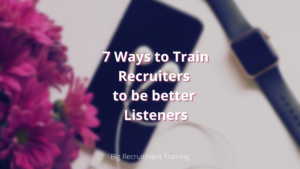Blog
7 Ways to Train Recruiters to be better Listeners
- December 21, 2020
- Posted by: Ishani Singh
- Category: Human Resource Recruitment

The only way to master the art of listening is to practice with each and every candidate. If you’re consistent and patient, you will get the result!
This year has, by common consent, been the year of listening – active listening. And that is so because, with the growing demand for talent, recruiters need to listen to the candidates more closely than ever before, i.e. they need to be better listeners.
But there are many recruiters, especially those from a sales background, who believe in speaking (and selling) more than listening. Recruiters are indeed a type of sales professionals. Their task is to sell candidates on skills and experiences. Like any other sales professional, they also need to learn what someone wants and needs before they can close the deal.
It’s about listening not only to set aside the candidates who don’t qualify for the role at hand but also to identify the candidates who will be easy sells. Good listening comprehension skill allows them to narrow down your candidate pool and focus on the ones that show signs of being a good fit.
Recruiters should stay fully engaged in such a conversation, asking relevant questions, and connecting the dots. Their ultimate aim of doing so is to gain an in-depth knowledge of the candidate before you end the discussion.
Here are 7 ways to train your recruiters to be better listeners – thus making them better closers than their competitors.
1. Teaching recruiters that listening is the key to selling

Some people are convinced that ‘selling’ and ‘talking’ are interchangeable. But the most effective recruiters, as well as salespersons, agree that listening more is the way to go. The better recruiters listen, the better their recruiting conversation will be – and the higher their conversion rate will be.
Today’s recruiters crave efficiency, so they’ll acknowledge that listening critically can save them efforts and time that would otherwise be wasted chasing dead ends.
2. By cultivating a non-judgmental listening approach
Processing information and drawing an inference is human instinct. And this creates arguably the most difficult challenge for recruiters – to refrain from quickly assessing a candidate’s fitness.
There is a need to cultivate an approach in which recruiters do not jump to any harsh conclusions in the middle of a discussion, instead they listen carefully with an open mind and break down all the acquired information into granules.
3. Training recruiters to listen and look out for nonverbal cues

Recruiters need to look out for the candidate’s body language and behavior to better understand the fears and insecurities. Good observation will draw your attention to the topic that the candidate chooses to leave untouched. After all, body language is a reflection of what’s in their head – people constantly leave tips about what they’re feeling and thinking.
4. Requiring new recruiters to shadow experienced recruiters
A recruiter with raw potential will undoubtedly learn a lot by observing and working with more experienced recruiters. This will allow the new recruiter to see different ways of working, the steps to take when there is a bump in the road, and how things are done generally.
The new recruiters will eventually realize that it’s important to be optimistic about the end goals – that the job of a recruiter is full of natural ups and downs.
It will ultimately also help new recruiters be better listeners
5. Engaging the recruiters in role-play conversations with dummy candidates
All the time spent observing and reading about the process is time well spent, but not sufficient for performing well. First-hand experience is necessary to develop the habit of active listening. This is where role-play sessions come in.
For training purposes, recruiters can be given a job description. They can then be asked to call a dummy candidate – perhaps one of the trainers – to do a mock interview. Doing so will allow the recruiters to use all that they’ve learned so far into practice.
6. Illustrating that candidate engagement leads to long-term success

The new recruiters need to know that candidate engagement is important for laying the first brick for building a long-term relationship with future employees.
These recruiters will be responsible for nurturing the incoming talent pool to reap the benefit later. Candidate engagement ensures a good relationship and makes it more likely to be referred to another candidate in the search for a job or a switch. It thus helps in locating and attracting the best and brightest minds.
7. Asking the recruiter to paint a meaningful portrait of the candidate
All the recruiters interview the candidate and check off boxes. But they need to be trained to compile those answers to draw a valid portrait of the candidate.
Recruiters can be asked to rank the different factors – company prospects, relevant skills, quality of life, learning ability, designation, compensation – for every individual candidate and the reason for choosing that particular hierarchy.
If they are not able to give a satisfactory response, ask them to schedule a follow-up call to get more information.
These were the 7 ways for recruiters to be better listeners.
Liked what you just read?
Share this article with your Friends and Colleagues
Follow us on Facebook, LinkedIn, or Instagram to stay up to date!

Ishani works as Manager – Social Media & Strategy Big Ideas HR Consulting Pvt. Ltd. and also as a Freelance Digital Marketer. She has a knack for problem-solving and also enjoys writing. She loves to share her views and knowledge with the readers by the medium of her blogs.

[…] about making the right communication, putting in the extra effort when your team is handling a hard-to-fill vacancy, and working to help […]
[…] can work on your listening skills and practice active listening. This will allow you to understand the complete message of the conversation. You should put more […]